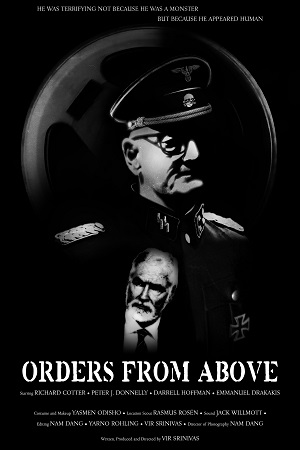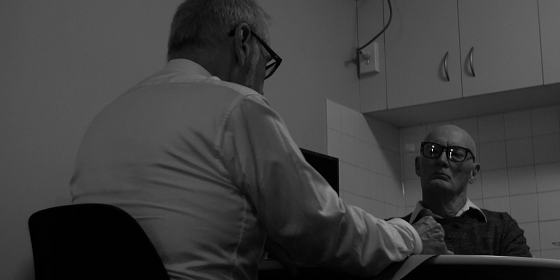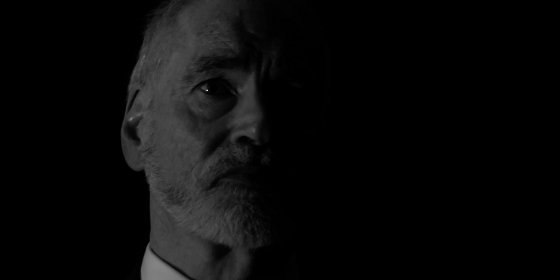

[Rating: Rock Fist Way Down]
Opens Tuesday, July 19, 2022 on VOD
One of the tricky ironies of filmmaking, as with most forms of art, is the hidden brilliance of total mastery. Some things strike even the most casual observer as impressive, such as cracking visual effects or riveting acting, yet when a film’s sound cues, editing, frame composition, lighting, or production design are on-point, most viewers never notice, and simply allow for themselves to get lost in the fantasy of the moment. When these critical details are not attended to, however, the essential nature of their combined contributions become inescapable, as is the case with Orders from Above, a small picture whose optimal reach is never realized.
Writer/director Vir Srinivas approaches this story more like a play than a motion picture, largely side-stepping any establishing shots or even character texture outside of the scenes that move the plot forward. The movie opens in 1960 with Israeli police captain Avner Less (Richard Cotter) speaking to his superior officer, who instructs Less to interrogate the recently captured Nazi war criminal, Adolf Eichmann (Peter J. Donnelly). Eichmann had been in hiding in Argentina in the 15 intervening years since the end of World War II, yet his capture and return to Israel now finds him on trial for his life.
The Israeli government is charging Eichmann with assisting in the organization and implantation of the Holocaust, arguing that he bears responsibility for the death of millions. Over the course of an unestablished period of time (the real-life Less interrogated Eichmann for 9 months) the two men spar over notions of duty and culpability, debating just how much of an accessory the captured Nazi was during the war. Exceedingly clever and with an excuse for everything, Eichmann argues that there is no evidence of him directly harming another person during the war, and that his oath as a soldier compelled to him follow orders that led to the deaths for which he’s on trial.

Orders from Above unfolds as a broad highlight of the real-life interrogations undertaken by Less as documented in the 1982 non-fiction book “Eichmann Interrogated,” with sections of the film’s dialogue pulled directly from that text. And while these records of the interrogation are fascinating and enlightening for any number of reasons (i.e., unpacking the justification process behind genocide, debating a soldier’s culpability during wartime, etc.) Srinivas never approaches anything resembling an epiphany or broader understanding, here. Much of this has to do with the script and its refusal to explore the moral complexity of these questions, yet the mechanics of the film itself do the broader effort no favors.
The way Srinivas frames the interrogations, which make up a majority of the film, comes across as clinical and without any intention. The camera will often hold on either Cotter or Donnelly for extended periods in a way that doesn’t involve the other, robbing the scenes of any tension or interplay that communicates how the information is being processed by the characters on-screen. There is rarely a sense of how things are being digested by the other individual in the scene, or any notion of how the successive meetings are wearing (or not) on these men. As stated earlier, the real-life interrogation took place over the course of 9 months, yet there isn’t a sense watching this thing that any such time has passed, robbing the story of any momentum or bearing.

The problems don’t stop there, either, with everything from the set design/wardrobe (phones, furniture, and clothing don’t reflect the early-60s setting) to sound mixing (the scene transitions are rough) pegging this as a half-hazard affair. Presented in black and white, the scenes don’t come across as thoughtfully lit, either, with the actors often plastered in light without any shading or depth. Again, when these small details are attended to, one hardly notices; here, when addressed with such casual nonchalance, it smacks the viewer across the face.
There is one attempt to bring the movie out of the rigid interrogations and into a broader context that connects it to the outside world, yet this subplot about possibly framing Eichmann to secure a conviction is both clumsy and poorly executed. There’s room for the movie to explore Less’ struggles with the case, or even Eichmann’s battle with his own conscience, yet creating a laughable moral dilemma that hardly existed in the first place just doesn’t fly, here.
One day someone will peel back the gruesome and abominable moral complexity of Adolf Eichmann to create something that speaks to more than the banality of evil, touching on mankind’s capacity for true malevolence. That day has not come, however, and Orders from Above is not that movie. A poorly conceived and badly managed presentation of one Nazi’s long-form benediction, the new film by Vir Srinivas leaves a lot to be desired, and even more to be explored.





Comments on this entry are closed.